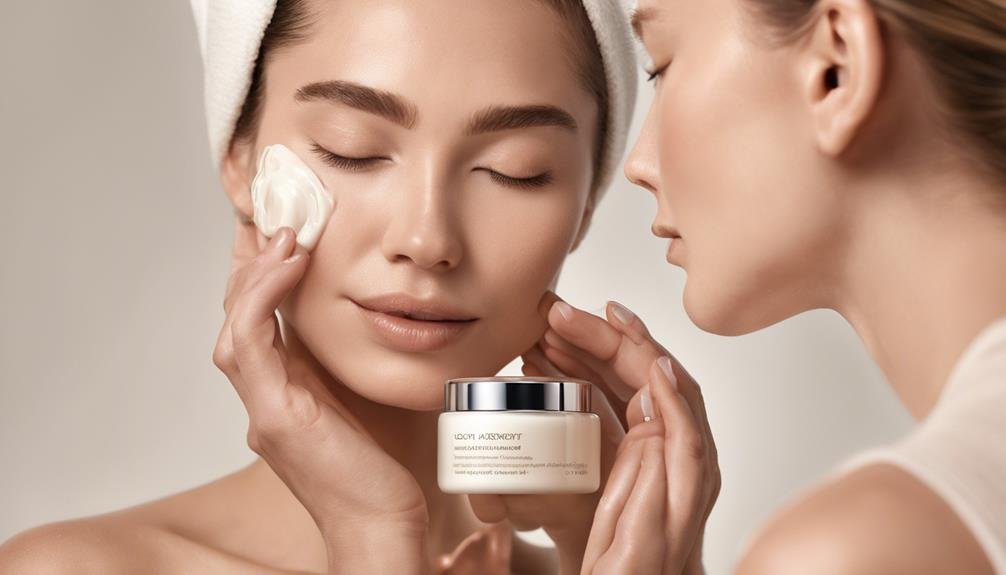"Cherishing Little Steps - A Haven for Baby and Family Journeys"
Improve Your Skin With Daily Habits
Did you know that your daily habits play a significant role in the health and appearance of your skin? By making simple changes to your routine, you can enhance your skin's natural beauty and vitality. From the way you hydrate to the products you use, every choice you make impacts the condition of your skin. Discover how small adjustments in your daily habits can lead to noticeable improvements in your skin's overall health and radiance.
Key Takeaways
- Hydrate adequately for radiant skin and cell regeneration.
- Prioritize 7-9 hours of quality sleep for skin repair.
- Shield skin with SPF daily to prevent premature aging.
- Cleanse gently to maintain clear and healthy skin.
- Consistent skincare routine with suitable products for skin health.
Hydrate Adequately

For optimal skin health, hydrating adequately is a fundamental daily habit that can make a significant difference in your complexion. Water is essential for maintaining skin elasticity, preventing dryness, and promoting a radiant glow. Proper hydration helps flush out toxins, supports cell regeneration, and improves overall skin function.
When you don't drink enough water, your skin can appear dull, dry, and may even show more fine lines and wrinkles. Dehydrated skin is also more prone to irritation and inflammation. Aim to drink at least eight glasses of water a day to keep your skin hydrated from the inside out.
Additionally, using hydrating skincare products can complement your internal hydration efforts. Look for moisturizers containing hyaluronic acid, glycerin, or ceramides to lock in moisture and strengthen your skin's barrier.
Prioritize Sleep
When it comes to maintaining healthy skin, prioritizing sleep plays a vital role in your daily habits. Adequate sleep is essential for skin repair and rejuvenation, promoting a radiant complexion and overall skin health. Here are some reasons why prioritizing sleep can greatly benefit your skin:
- Enhances Skin Repair: During sleep, your body produces collagen, which helps repair and renew skin cells, reducing signs of aging.
- Reduces Inflammation: Lack of sleep can lead to increased inflammation, exacerbating skin conditions like acne and eczema.
- Improves Skin Barrier Function: Quality sleep supports the skin's protective barrier, preventing moisture loss and maintaining a healthy glow.
- Boosts Blood Circulation: Proper sleep increases blood flow to the skin, delivering essential nutrients and oxygen for optimal skin health.
Make a conscious effort to prioritize sleep, aiming for 7-9 hours each night to reap the benefits of glowing, healthy skin.
Protect From Sun

Shielding your skin from the sun's harmful rays is crucial for maintaining healthy skin and preventing premature aging. Sun exposure is the leading cause of skin damage, including wrinkles, dark spots, and sagging skin. To protect your skin effectively, make sunscreen a non-negotiable part of your daily routine.
Opt for a broad-spectrum sunscreen with an SPF of 30 or higher and apply it generously to all exposed skin, even on cloudy days.
Aside from sunscreen, consider wearing protective clothing like hats, sunglasses, and long sleeves when spending extended periods outdoors. Seek shade during peak sun hours, typically between 10 a.m. and 4 p.m., to reduce direct UV exposure. Remember that sun damage accumulates over time, so consistent protection is key.
Cleanse Gently
Protecting your skin from the sun is a vital step in maintaining its health and youthfulness. Cleansing your skin gently is another crucial daily habit to enhance its overall condition. By following a few simple steps, you can ensure that your skin remains clean and clear:
- Use a mild, fragrance-free cleanser to avoid irritating your skin.
- Gently massage the cleanser onto your skin in circular motions to remove dirt and impurities effectively.
- Avoid using hot water, as it can strip your skin of its natural oils and lead to dryness.
- Pat your skin dry with a soft towel instead of rubbing it harshly to prevent irritation.
Moisturize Daily

To maintain optimal skin health and hydration, incorporating a daily moisturizing routine is essential. Moisturizing your skin daily helps to replenish lost moisture, strengthen the skin's natural barrier, and prevent dryness and irritation. When choosing a moisturizer, opt for one that suits your skin type – whether you have oily, dry, combination, or sensitive skin.
Look for ingredients like hyaluronic acid, glycerin, ceramides, and shea butter, which are known for their hydrating and nourishing properties. Applying moisturizer on slightly damp skin helps lock in moisture more effectively.
Remember to use SPF during the day to protect your skin from harmful UV rays which can accelerate skin aging and damage.
Make moisturizing a part of your daily skincare routine, both in the morning and at night, to keep your skin looking healthy, supple, and radiant. Consistency is key when it comes to maintaining a glowing complexion, so make moisturizing a non-negotiable step in your skincare regimen.
Eat Skin-Friendly Foods
Nourishing your skin goes beyond external care; what you consume also plays a critical role in achieving a healthy complexion. Eating skin-friendly foods can provide your skin with the necessary nutrients to maintain its health and radiance. Here are some key foods to include in your diet for glowing skin:
- Fatty Fish: Rich in omega-3 fatty acids, fish like salmon and mackerel help keep the skin hydrated and reduce inflammation.
- Berries: Packed with antioxidants, berries like blueberries and strawberries protect the skin from damage caused by free radicals.
- Avocados: Loaded with healthy fats and vitamin E, avocados help moisturize the skin and protect it from UV damage.
- Nuts and Seeds: Almonds, walnuts, and flaxseeds are great sources of essential nutrients like vitamin E, zinc, and selenium, which promote skin health.
Incorporating these skin-friendly foods into your daily meals can make a noticeable difference in the health and appearance of your skin.
Exercise Regularly

Regular exercise is a cornerstone of a healthy lifestyle, with benefits that extend beyond just physical fitness. When it comes to your skin, working out regularly can help improve its appearance and health. Exercise increases blood flow, delivering essential nutrients and oxygen to your skin cells. This boost in circulation also helps carry away waste products, promoting a clearer complexion.
Moreover, sweating during exercise helps to unclog pores and expel toxins from your skin. This natural detoxification process can contribute to a more radiant and glowing complexion.
Additionally, regular physical activity can reduce stress levels, which is key in preventing breakouts and other skin issues.
Whether you prefer high-intensity workouts or calming yoga sessions, finding an exercise routine that you enjoy and can stick to is crucial for reaping the skin benefits. Aim for at least 30 minutes of moderate exercise most days of the week to support healthy skin and overall well-being.
Manage Stress Levels
As you focus on maintaining a healthy lifestyle and improving your skin, managing stress levels plays a significant role in achieving glowing and resilient skin. Stress can wreak havoc on your skin, leading to dullness, breakouts, and premature aging. Here are some tips to help you manage stress effectively:
- Practice Mindfulness: Engage in activities like meditation or deep breathing exercises to calm your mind and reduce stress levels.
- Get Adequate Sleep: Quality sleep is essential for skin repair and rejuvenation, so aim for 7-9 hours of restful sleep each night.
- Stay Active: Regular physical activity helps release endorphins, which can improve your mood and reduce stress.
- Connect with Loved Ones: Building strong relationships and having a support system can help you cope with stress more effectively.
Incorporating these habits into your daily routine can't only benefit your overall well-being but also contribute to healthier, more radiant skin.
Avoid Harsh Products

Opt for gentle skincare products that prioritize skin health and avoid harsh ingredients that can strip your skin of its natural oils and cause irritation. Harsh products containing ingredients like alcohol, sulfates, and synthetic fragrances can disrupt the delicate balance of your skin, leading to dryness, redness, and even breakouts. Instead, look for products with soothing ingredients like hyaluronic acid, glycerin, and antioxidants that nourish and protect your skin.
When choosing cleansers, opt for mild, non-abrasive formulas that effectively cleanse without causing irritation. Avoid products with high levels of exfoliating acids or physical exfoliants that can damage the skin barrier.
Additionally, be cautious with toners that contain alcohol, as they can be overly drying.
Follow Consistent Routine
Maintaining a consistent skincare routine plays a significant role in achieving and maintaining healthy skin. Establishing good habits can lead to long-lasting benefits for your skin.
Here are some key points to consider:
- Morning and Night: Start and end your day with a skincare routine that includes cleansing, moisturizing, and sun protection.
- Consistent Products: Use products suitable for your skin type consistently to avoid irritation or adverse reactions.
- Regular Exfoliation: Incorporate gentle exfoliation into your routine to remove dead skin cells and promote skin renewal.
- Hydration is Key: Keep your skin hydrated by drinking enough water and using hydrating products to maintain a healthy skin barrier.
Get Enough Vitamin D

To ensure optimal skin health, prioritizing adequate intake of Vitamin D is crucial. Vitamin D plays a significant role in skin health by promoting cell growth, repair, and metabolism. Sunlight is a primary source of Vitamin D, but you can also find it in foods like fatty fish, eggs, and fortified dairy products. Ensuring you get enough of this essential vitamin can help maintain healthy skin, reduce inflammation, and support overall skin function.
Research suggests that Vitamin D deficiency may contribute to skin conditions such as eczema, psoriasis, and acne. By incorporating Vitamin D-rich foods into your diet or spending some time in the sun each day, you can support your skin's health and appearance. However, it's essential to balance sun exposure to avoid harmful UV rays. Consulting with a healthcare provider to determine the right Vitamin D levels for you can help you maintain healthy skin and overall well-being.
Prioritizing adequate Vitamin D intake is a simple yet effective way to improve your skin health from the inside out.
Stay Consistent and Patient
Ensuring you consistently maintain healthy habits and remain patient is key to seeing improvements in your skin over time. Consistency and patience allow your skin to adjust to new routines and treatments, leading to long-lasting results. Here are some tips to help you stay on track:
- Establish a Routine: Create a skincare routine that you can stick to daily. Consistency in cleansing, moisturizing, and applying treatments is crucial for healthy skin.
- Monitor Progress: Keep track of changes in your skin over time. Progress may be gradual, so it's essential to note improvements, even small ones.
- Seek Professional Advice: If you're not seeing the desired results, consult a dermatologist. They can provide personalized recommendations and treatment options.
- Practice Self-Care: Stress can impact your skin's health. Incorporate stress-relieving activities into your routine to support your skin's well-being.
Frequently Asked Questions
Can Genetics Affect Skin Quality Despite Following These Habits?
Yes, genetics can influence skin quality despite adopting these habits. While daily routines can enhance skin health, genetic factors like collagen production and skin elasticity play a significant role. Consistent care can still improve skin, but genetics remain a factor.
How Soon Can I Expect to See Results in My Skin?
You should start noticing improvements in your skin within a few weeks of consistent habits. Like a seedling sprouting into a vibrant bloom, your skin will gradually reveal a healthier glow as you maintain your daily routine.
Is It Necessary to Use Expensive Skincare Products?
You don't have to use expensive skincare products. Quality ingredients, consistency, and a good routine matter most. Look for products with ingredients that suit your skin type. Focus on gentle cleansing, moisturizing, and sun protection.
Can Overexercising Have a Negative Impact on Skin Health?
Overexercising can lead to negative skin impacts like increased inflammation, dehydration, and breakouts. Ensure you balance workouts with proper hydration, post-exercise skincare, and cleansing to maintain skin health while staying active and fit.
What Role Does Water Temperature Play in Cleansing Skin Effectively?
To cleanse skin effectively, use lukewarm water. Hot water can strip natural oils, causing dryness, while cold water may not effectively remove dirt. Lukewarm water helps maintain skin's natural moisture balance. Remember, moderation is key for healthy skin.
Conclusion
In conclusion, remember the old saying "Rome wasn't built in a day." Just like the ancient city, achieving beautiful and healthy skin takes time, dedication, and consistency. By incorporating simple daily habits such as hydrating, getting enough sleep, and protecting your skin from the sun, you can promote optimal skin health and achieve a radiant complexion. Stay committed to your skincare routine, be patient, and watch as your skin transforms over time.

